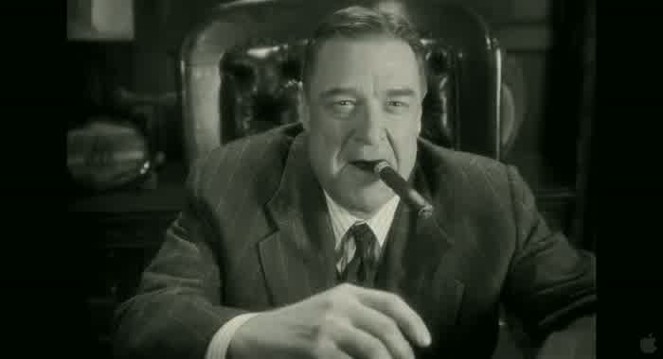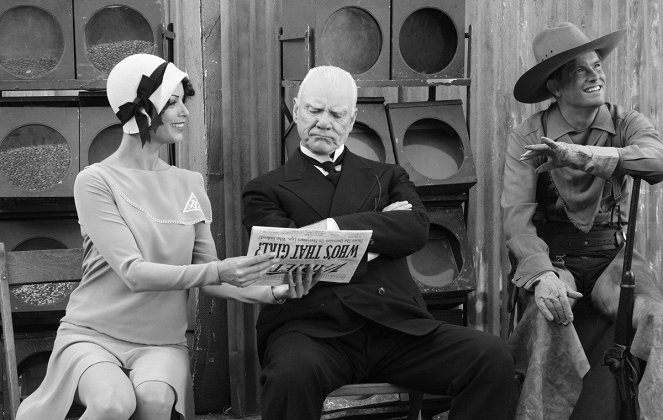Directed by:
Michel HazanaviciusScreenplay:
Michel HazanaviciusCinematography:
Guillaume SchiffmanComposer:
Ludovic BourceCast:
Jean Dujardin, Bérénice Bejo, John Goodman, James Cromwell, Penelope Ann Miller, Missi Pyle, Beth Grant, Ed Lauter, Elizabeth Tulloch, Ken Davitian (more)VOD (2)
Plots(1)
Hollywood 1927. George Valentin (Jean Dujardin) is a silent movie superstar. The advent of the talkies will sound the death knell for his career and see him fall into oblivion. For young extra Peppy Miller (Berenice Bejo), it seems the sky’s the limit major movie stardom awaits. The Artist tells the story of their interlinked destinies. (Entertainment in Video)
(more)Videos (37)
Reviews (11)
The Artist is certainly not nearly as bad as my single star would suggest, but it is also not nearly as good as the enthusiastic comments and five-star ratings from others would imply. I will completely leave aside the fact that it has numerous Oscar nominations and a real chance of winning overall because the bestowal of Oscars has never represented and does not represent a stamp of quality in the history of cinema. The Oscars simply represent the calculation of the film academy, which succumbs to certain trends, moods, and clever advertising by distributors, just like the audience itself. I will say it like this: The Artist is a typical midcult, as defined by Umberto Eco in his book of essays dedicated to culture. This means a skillfully made film that pretends to be avant-garde and cleverly plays with the snobbery of those film viewers who scorn ordinary consumer production and present themselves as admirers of artful productions. It is a film that does not burden the brain, does not hide within itself any ideas or artistic risk, and relies on the certainties and professionalism of filmmaking. Of course, it is not original either; this has been seen several times before, and I would say in a less pleasing but more emotionally convincing execution. The Artist is unlucky because I saw it in a movie theater that I rarely visit and I am overly picky. If I saw it on TV, I would have turned it off after 20 minutes and not reviewed it. Under these circumstances, it made me furious, especially since I had company with me and couldn't leave the movie theater. For me, this film is simply too pleasing and superficial; emotionally, I completely missed the point and I could engage with its game. It reminds me of the huge soap bubbles that my children created at the water park. They look impressive, but they burst immediately and nothing remains of them. In two years, when the current Oscar fascination fades away and the effect of the smart marketing campaign of the production company wears off, I don't think anyone will even mention The Artist. But there are a few positives. Bérénice Bejo is truly lovely, and the stylization of the late 1920s, although it has little in common with the reality of the events in film production at that time, has its charm. Also, if it were edited into a stylish 30-minute slapstick, it would evoke completely different feelings in me. Overall impression: 25%.
()
Who would have thought that a silent film can astonish me even at a time when talkies are the norm and we’re seeing the rise of 3D movies? In fact, it is an absolutely beautiful throwback and homage to the film of the past. And this is what the very imaginative story of this movie is based on. Well, I have to admit that although Jean Dujardin seemed a bit crazy to me in his earlier films, here he showed that he’s a master of his craft even without sound. Perhaps I will never forget the scene where he appears at the ball, frowns and looks for something. There are so many emotions in that face that it can’t even be described. At that moment you’ll just fully understand what that means. And you’ll find out you can do without any lines or sound without a problem. The same goes for the final scene. I couldn’t imagine a more beautiful dance number. And shot in one go? Oh my God, is someone still filming such scenes these days? Hats off, for such a film experience does not occur every day. And that’s probably a good thing; thanks to this, this film gains a lot of uniqueness, which it will never lose.
()
The pure charm of film escapism. A film about a time when celluloid burned, which burns itself and yet miraculously does not burn itself with too much reverence and foresight into the past. The work with a soundtrack and a silent film is a famous directorial move, not only because it cleverly brings to the fore what would never have stood out in a spoken film, but also because it is almost ingenious in its simplicity. A silent film that did not elevate its silence to a dubious fetish (let's love how beautiful it was, we will not see that anymore today), but the most significant narrative component (the film is magical in itself, not because it reminds us of something). Hazanavicius did work that I applaud. If any critics wrote of The Descendants as a worked gem, they mistook the film. This is a feel good gem from which my jaw dropped.
()
When I found out which film won the main awards at the Oscars, I was very surprised. The best director was a Frenchman that nobody had really heard of before, and the same was true for the best actor category, where I was disappointed that Brad Pitt didn't win the award, as he deserved it a lot. Perhaps he should have danced in "Moneyball." However, the biggest shock was that the award for the best film went to a movie that was neither American nor co-produced, it was a French-Belgian film. "The Artist" was personally like a bolt from the blue for me. The presence of several film stars in it still doesn't make it an American film, but on the other hand, a film was created that is incredibly American in the sense that it takes place in the USA, from 1927 to 1932, which were not only the years of the crisis but also the years when the transition from silent film to talkies was happening and the stars of silent film were forgotten. This is exactly the case of George Valentin, who can't come to terms with the fact that people want to see talking actors. "The Artist" is a film that showcases the era in its beauty, it is a tribute to American silent film and silent film in general, it is a beautiful film, a film for the viewer. Yes, it is possible to watch a silent film and enjoy it even in the 21st century. It is good that the film made it to cinemas and that people know about it. Perhaps there will be increased interest in other silent films of the modern era. Michel Hazanavicius created a work that is not stunning in terms of the script, but it is stunning in its presentation, form, and cinematic beauty. More: http://www.filmovy-denik.cz/2012/05/9-umelec-diktator-nacho-libre-rise.html
()
I wasn’t particularly enthused about this. I suspected that the film would not be quite right and that's why I postponed watching it. Then, just to be sure, I watched it again. It's not an entirely bad film, and if it inspires even a fraction of viewers to discover real silent films, then it has served its purpose. On the other hand, the story is just a continuation of the bad aspects of Singin' in the Rain, and I have a huge problem with that. The heroes of yesteryear can be none other than the combination of Rudolph Valentine, Douglas Fairbanks, and John Gilbert. Fortunately, there's also the cheerful studio owner and anyone from those legendary head honchos to William Randolph Hearst (played by the excellent John Goodman). The film also features a cleverly trained dog, believable sets, gorgeous costumes, a near-perfect final dance number, and some hope for a better tomorrow. What is somewhat deceptive is the sound nightmare and especially the 1936 song used as background for 1931. Equally problematic and redundant is the conveyance of actual footage from The Mark of Zorro (1920). The question thus remains whether the story of silent film is really interesting just because that era is long gone.
()



Ads